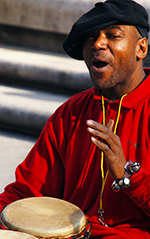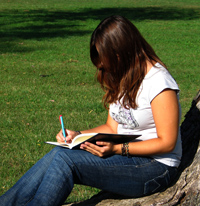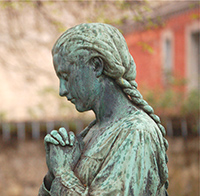Unfortunately I have to disagree with Mae West who said "too much of a good thing is wonderful". When it comes to meditation, as well as almost every other "good thing" in life, there can be too much. Food, water, sunshine, exercise, rest -- everything in life -- needs to be in balance. As wonderful as good as meditation may seem, too much is not wonderful at all, but may cause discomfort and interfere with our functioning.
LoraC left a comment today saying that since starting meditation, she finds herself crying more easily and also has become clumsy and has been tripping and even fell. She loves the relaxation of meditation, but these things concern her. Of course, I didn't have enough information to know for sure what is happening with her, but it is certainly possible that she is meditating too much.
Too much meditation can make you "spacey" and ungrounded. It can weaken your mind-body coordination. This could be why LoraC is feeling clumsy and tripping. As for her crying more readily, it's just possible that some emotions are being released as a result of the deep relaxation in the meditation. Usually emotional releases would happen during meditation time and not create any concern. But if there starts to be a lot of release or intense emotional processing outside of meditation, it could be that too much is happening too fast. Since these things seem to have started after LoraC began "meditating in earnest", an easy way to find out if it's from meditation is to stop meditating for awhile or cut back on the meditation time or frequency. If the clumsiness and crying go away, then clearly too much meditation is the culprit and the time and frequency of meditation can be adjusted accordingly.
What is the right amount of meditation? How often and how long should you meditate? The answer is it depends. It depends on you -- your constitution, lifestyle, goals for meditation and many other factors. It also depends on the type of meditation. For most people and most meditation styles, usually once or twice a day for 15 - 30 minutes, would work well. Unless you have the personal guidance of a teacher, you will need to experiment and find out what works best for you.
If meditation is enhancing your life, you've found a good balance. If it seems to be creating problems, it may be that you are meditating too much or that you might need to be doing a different kind of meditation. LoraC might find that if she does the grounding meditation or body awareness meditation, she would feel less clumsy as these meditations can help strengthen mind-body coordination.






